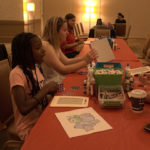
The tour of Thailand that two St. Louis–based Maritz Travel employees took late last year was a familiarization trip of an entirely different kind. The 10-day, inaugural Advocacy Journey, organized by ECPAT-USA, Ending Child Slavery at the Source, was designed to give what Sarah Porter, the organization’s director of development and partnerships, called “an educative perspective about the issue of human trafficking.”
Maritz Travel sponsored Jana Nester, meeting and event manager, and Laura Pilkenton, manager of guest services, as part of its ongoing commitment to the cause. The trip’s only travel-related participants, Nester and Pilkenton were joined by a freelance writer, an attorney who volunteers her services to ECPAT-USA, ECPAT-USA’s board chair, three other workers in the field of ending human trafficking, and Porter. They were led by a local guide and interpreter from AltruVistas, a socially responsible tour operator that focuses on sustainable and philanthropic travel.
ECPAT was founded in Thailand 25 years ago in response to the child-sex-tourism trade that was flourishing in Southeast Asia. Because the crime continues to persist there, Thailand was the appropriate setting for ECPAT’s first Advocacy Journey, held on Nov. 7–17. But Thailand is also a country that is rich in history, culture, and natural beauty, so every effort was made to ensure that the trip itinerary — which included stays in the capital city of Bangkok and the northern provinces of Chiang Rai and Chiang Mai — would offer “a meaningful experience in a fascinating place,” Porter said. Built into the schedule were visits to ancient Buddhist temples, sprawling outdoor markets, and even an elephant conservation center.
Participants experienced the highs and lows of Thai culture, including visits to organizations that exposed the country’s underbelly. Hearing from the leaders of such groups, participants tried to wrap their heads around the conditions that make human trafficking possible. While that easily could have led to despair, the message that kept getting reinforced, Porter said, was one of hope and salvation. The trip “focused on the positive,” she said, “on the good work being done on the ground, that organizations like ECPAT are doing to combat child sex trafficking and to protect children from exploitation.”
The money that participants paid for the trip is helping fund those organizations’ fight against human trafficking. But the investment of Nester’s and Pilkenton’s time would be even more valuable once they left Thailand, Porter said, and took “that education and that advocacy back home with them.”
AN EMOTIONAL JOURNEY
Maritz Travel has been at “the forefront of this issue,” Porter said. “They understand the power of travel and tourism, and how it can combat trafficking.” Indeed, both Nester and Pilkenton have been active members of Maritz Travel’s Human Trafficking Steering Committee — a company-wide awareness program — for several years, and their fellow committee members nominated them to go on the Thailand trip.
No matter how prepared the two thought they were, they found the trip deeply emotional, even though they weren’t directly exposed to child victims. “ECPAT does a really good job of touring with a cause without disturbing the efforts on the ground,” Nester said. “We didn’t really interact with any children or victims, just because we’re not trying to disrupt their lives in order to improve our knowledge of their situation. We met with administrators who were working directly with these people. Really, what we heard were personal stories of why people came to fight for this cause.”
In Bangkok, the group attended presentations given at the ECPAT International office, Thailand’s Ministry of Social Development and Human Security, the office of The Code of Conduct for the Protection of Children From Sexual Exploitation in Travel and Tourism, and the Office of the International Labour Organization. They spent two days in Chiang Rai, near the border with Myanmar (Burma), where they visited organizations that address the needs of the region’s hill tribes and migrant families, a particularly vulnerable population — including the ECPAT Foundation’s local office and The Daughters’ Education Program, a school that provides education and a safe haven for children regardless of citizenship or nationality. This was an eye-opener even for Porter, who said she hadn’t been “familiar with how migrant populations are exploited and additionally vulnerable.”
In Chiang Rai, Nester and Pilkenton were inspired by the story of Kru Nam, a local woman who couldn’t turn a blind eye to the plight of children on the border who were being bought and sold for sex. She founded a grass-roots, direct-intervention project for displaced children. “She’s just simply amazing,” Pilkenton said. Nam didn’t set out to start a charity; she simply took matters into her own hands “by literally walking across the border into Burma and taking 10 children out of absolutely deplorable situations home with her,” where she cared for them and got them in school.
Nam and others who are “from the populations that they’re working with,” Porter said, gave the group hope, even when they were confronted with utter depravity. “The most horrifying thing that we heard,” Nester said, “was one of the new up-and-coming trends of commercial surrogacy — actually breeding children for abuse.”

“I think what stuck with a lot of people on this trip were these unsung heroes,” Porter said. “These individuals who saw that there was something going on in their country, that it wasn’t right, and wanted to do something about it. Who saw that this issue was affecting their nation’s most vulnerable population — children who were being bought and sold for sex.”
SPREADING THE WORD
Since they’ve returned home, Nester and Pilkenton have been sharing their experiences in webinars for Maritz Travel staff and through additional outreach initiatives. At the beginning of a recent webinar, three numbers were repeated for the audience, to give them a sense of this issue’s scope: 27, 2, and 12. According to A21, a nonprofit dedicated to ending human trafficking, there are 27 million people in bondage for the purposes of forced labor and sex trafficking in the world today. Only 1 to 2 percent of victims are ever rescued. And the average age of a trafficking victim is 12.
Statistics don’t stay with people the way stories do, so Nester and Pilkenton keep sharing their experiences. “The more people that become aware of this situation, the more people that are educated to see the signs and to know that this happens everywhere you go,” Pilkenton said, “the better we’re going to be able to fight it.”
Nester added: “By educating our on-site deployment team, who go out and travel the world and talk with millions of other people around the world — that’s exponential awareness.”
The Advocacy Journey was far from a carefree trip, but Porter said she didn’t get the sense that anyone left Thailand feeling hopeless. “I think if anything, we could see that there was real impact being made on the ground,” she said. “That really did speak volumes.”
‘Our Moral Imperative’
David Peckinpaugh, president of Maritz Travel, sees the fight against human trafficking “as part of our obligation, to not only the industry, but as a global citizen. It doesn’t seem rational to me that anyone who is exposed to this issue wouldn’t feel the same obligation. I see this as part of our moral imperative, and we are all honored to be engaged in the effort to stop this crime.” He shared with Convene why Maritz Travel sent Jana Nester and Laura Pilkenton on ECPAT-USA’s Advocacy Journey.
Why did Maritz Travel invest in sending two employees on a trip to Thailand?
While human trafficking is incredibly active in the U.S. and in many of our local communities, the fact is that one of the hotbeds is Thailand. The opportunity to have two members of our team see and learn firsthand about the issue was one that we couldn’t pass on. In addition, we are committed to the efforts of ECPAT and saw this as a way to further our level of support and engagement.
What were you hoping to achieve from this trip?
To have those two staff members serve as catalysts for change. They are sharing their experiences and stories internally through multiple sessions, which is helping bring the issue even more to life. We hope to get everyone aware and engaged in driving the ultimate solution to this crime.
How can their experiences help change the meetings industry?
It’s amazing to me how many people and organizations are not aware of the extent of human trafficking. It’s not a Thailand issue — it’s a U.S. issue, a St. Louis issue, a Chicago issue, a New York issue. It’s in your backyard.
The first step is awareness, and we have already made significant progress. The next step is taking action. We can’t afford to sit idly by. We encourage everyone in our industry to get involved, whether individually or through their organization. ECPAT is a great organization, and there are many more across the U.S. Just get involved.




